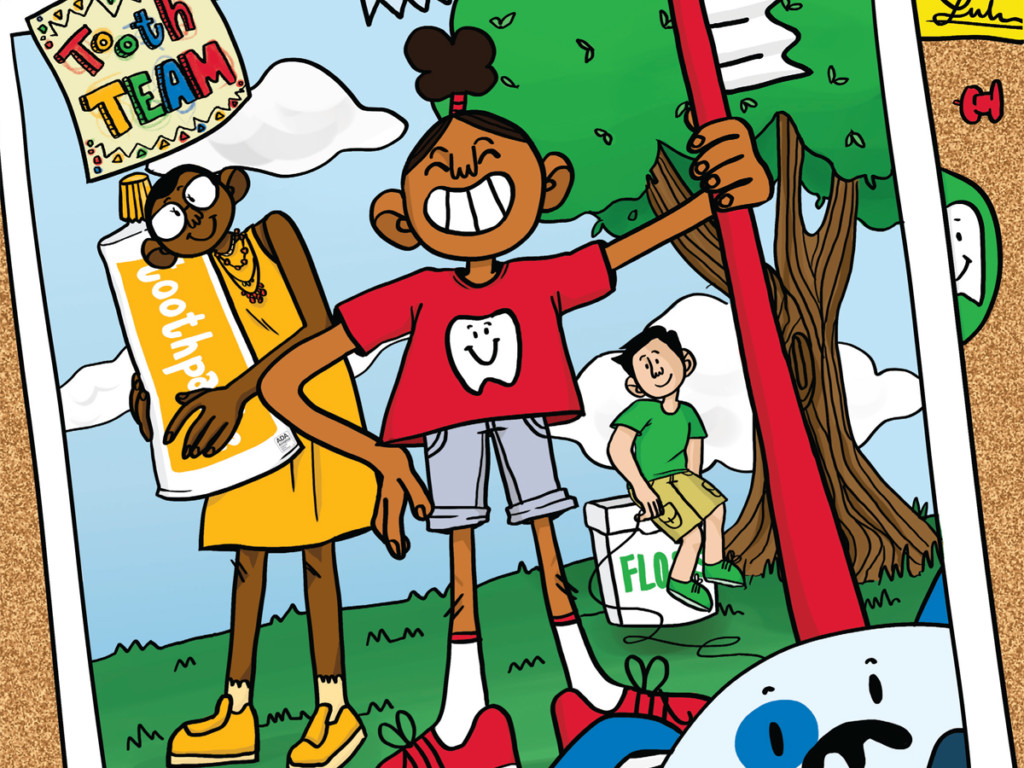[dropcap]F[/dropcap]ebruary celebrates a number of special events: Black History Month, Groundhog Day, Valentine’s Day, but it also hosts one lesser-known holiday that’s important for your kids’ health:
[typography font=”Cantarell” size=”24″ size_format=”px”]National Children’s Dental Health Month![/typography]
 Photo Courtesy of the American Dental Association
Photo Courtesy of the American Dental Association
My 7-month-old has 4 teeth, and when I try to put a toothbrush in his mouth to clean all these new little chompers, a monster is let loose. My sweet, docile, smiley little boy, the happiest kid I know, turns into a jaw clenching, head thrashing, terror. It’s like trying to brush the teeth of a shark, except that I know I’ll be able to walk away from the ordeal with my limbs still intact, though my heart rather bruised. Unfortunately for my frustration levels, oral hygiene is a really big deal for little mouths.
Desperate to do right by my little guy but put an end to the nightly madness, I reached out to Megan Butler, DMD, of Johns Creek Dental. “Is caring for baby teeth really that big a deal?,” I asked. Her response:
[typography font=”News Cycle” size=”16″ size_format=”px”]”In a word, yes.” [/typography]
Apparently, in order to avoid Early Childhood Caries (Google it; it sounds pretty terrible), brushing your child’s teeth is necessary as soon as the teeth erupt.
The good news, she tells me, is there are some ways to care for his teeth that might avoid his crocodile tears and shark-like fury. Here are a few of her tips:
- Use a washcloth. Wrap it around your finger and put a tiny bit of fluoride toothpaste on it
- Use just a smear of toothpaste, the size of a grain of rice
- As baby ages, slowly graduate to using a soft toothbrush
- At age 3, up the toothpaste amount to the size of a pea
Experiment with toothpaste flavors! Finding the right one can be a total gamechanger. This routine should be the very last thing you do before bedtime. Avoid letting your baby fall asleep with a bottle that has anything other than water in it, and never put juice in a bottle. Juice is acidic like soda, and acidic drinks encourage tooth erosion.
[typography font=”Cantarell” size=”24″ size_format=”px”]Other Tips From the Dentist[/typography]

I found these tips to be so helpful, and since our goal here at AAMB is to make your lives easier, I just kept the questions coming and have given short versions of her answers here.
When do you suggest children start having regular dental check-ups?
The ADA recommends children begin going to the dentist when their first tooth erupts, or by their first birthday.
I’m officially intimidated. What can I do to make this process easier?
- Think of early visits as making later ones easier – it’s a great way for your child to get used to the dental environment!
- Take your kids to your own dental checkups! Children often mirror their parents, so if they see their mom or dad comfortable in the dental chair, they are less likely to develop a dental fear.
- If your child isn’t comfortable enough at a standard dentist, give a pediatric dentist a try. Their offices are designed with the kids’ utmost comfort in mind – think bright colors, child-friendly waiting rooms, and treatment chairs, etc.
What about special needs children? Are some dentists better than others?
Pediatric dentists are equipped with the latest techniques to manage and comfort kids who may have dental anxiety, behavioral concerns, or special health needs.
What do you wish more parents knew about caring for their children’s’ dental health?
The short answer
Healthy “baby teeth” set the stage for strong teeth and gums as adults, in addition to saving your child unnecessary pain and potentially trauma.
The long answer:
I often have parents ask me why it’s so important to treat cavities when they’re “just baby teeth.” And I definitely understand why parents ask because until dental school I didn’t fully understand the importance of primary teeth either.
However, primary or “baby” teeth help your child chew and speak properly, and they serve as placeholders for your child’s future adult dentition. Early loss of primary teeth, either by decay or trauma, can lead to excessive tooth crowding and require uncomfortable and complicated orthodontic procedures.
Moreover, baby teeth that have extensive decay could lead to an infection, which could cause your child’s baby tooth to abscess and cause pain. Acute dental infections can even spread to other parts of the body. Being proactive in setting up your child’s dental check-ups at an early age is the best way to prevent this emergency.
What are the best things we can do at home to help improve children’s dental health?
- Supervise and help your children while they brush and floss
- Be sure to help them brush twice a day – leaving plaque and bacteria in their mouth overnight is how many pediatric cavities start!
- Once the gaps between your child’s teeth begin to close, help them floss in between their teeth.
- Use floss cutters (the floss that has a handle on it) in the beginning until they can get the hang of traditional floss and wrap it around their teeth in the ideal “C” shape.
- Turn tooth-brushing into a game
- Use a song so that your child brushes for the entire recommended 2 minutes
- Check out the ADA’s YouTube channel with videos of 2-minute songs to use.
- Create some sort of reward system to help motivate them until the habit is formed
Children often focus on a thorough brushing of their front teeth but tend to skip brushing their back teeth, which can lead to cavities. By helping them brush and floss their entire mouth until they develop the ability and maturity to do this on their own, you are helping them fight against tooth decay.
What is the main issue you see in adults that possibly could have been prevented during childhood? What prevention methods would you recommend?
It’s all about the gums! In a 2012 report from the CDC, periodontal (also known as gum) disease affected nearly half of all adult patients. Simply put, periodontal disease is caused by bacteria (plaque) chronically infecting the gums. That’s right, bacteria doesn’t just cause cavities!
With all this in mind, I cannot stress enough the importance of helping your child develop an early habit of flossing their teeth. There’s a reason why your dentist always harps on your flossing habits! We want you and your children to keep your teeth for a lifetime, and your flossing habits play a huge role in this goal.
[typography font=”Cantarell” size=”24″ size_format=”px”]How Do I Find a Good Local Dentist?[/typography]
Ask around! Since some of us are new to this whole mom thing and don’t have a ton of mom friends in our areas to ask, so I’ve polled our contributors to give you some personal recommendations! (Note: I haven’t confirmed whether all of these offices are accepting new patients.)
Family Dentists:
- Johns Creek Dental (Suwanee)
- Peachtree Smile Center (Buckhead/Midtown)
- Ashpole Dental (Decatur)
- Buckley Dental Care (Roswell)
Pediatric Dentists
- Schwartz Dentistry for Children (Smyrna)
- Eaton Pediatric Dentistry (Decatur)
Specifically Recommended for Special Needs
- Atlanta West Dentistry (Marietta/Powder Springs)
- Dr. Bahrami at Highland Family Dentistry (Hiram)

















